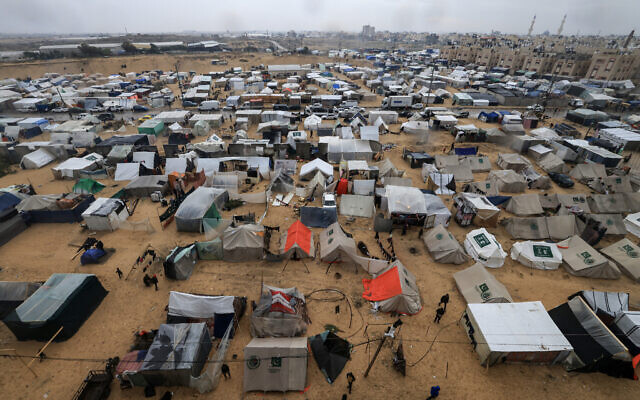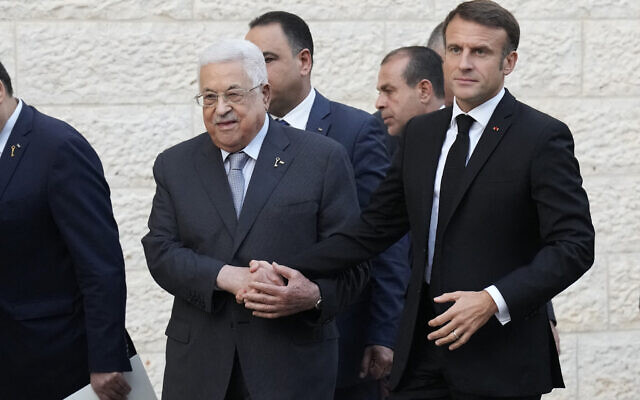



Palestinian Authority President Mahmoud Abbas vowed Tuesday that the PA will return to rule over Gaza despite Israeli opposition, and said that the period following the war will be a “test” for the US to prove that it can keep its word to Ramallah in backing a “revitalized” form of PA rule over the Strip.
“We don’t need to return to Gaza, we are already there,” the PA leader repeated multiple times in an interview with journalist Lamis Elhadidy on the Egyptian ON television channel, stressing that since the PA was ousted from the coastal enclave in 2007, it has continued to pay salaries to thousands of its local employees.
Abbas claimed that to this day, Ramallah disburses $140 million every month for salaries, electricity and medical bills for its people in Gaza, and therefore still has a network of affiliates in the Hamas-run territory.
The leader rebuked the US for its continued support for Israel ever since the Hamas massacres of October 7, adding that if the US would simply not use its veto in the UN Security Council, the war would come to an end.
Insisting that a Palestinian state must be established in the aftermath of the conflict, Abbas reiterated that it must be composed of the West Bank, Gaza and East Jerusalem, and suggested that the West Bank could “explode” into further violence at any moment.
Abbas called the ongoing war in Gaza worse than the nakba, the mass exodus and expulsion of Palestinians that ensued after the establishment of the State of Israel in 1948.
“In the nakba, people were forced to leave their land, but what is happening now in Gaza is even more terrible – schools, mosques, all the buildings, everything is being destroyed,” Abbas said. He added that more than 20,000 Gazans have been killed — an unverified figure provided by Hamas which does not differentiate between civilians and Hamas members — and over 7,000 are buried under the rubble of destroyed buildings. Israeli sources have said IDF troops have killed more than 8,000 Hamas operatives so far.
In the interview, Abbas did not condemn Hamas for its brutal onslaught against Israel on October 7, in which 1,200 Israelis were killed and about 240 were abducted to Gaza, but he rebuked Hamas for not “following up” after the reconciliation talks among Palestinian factions that were held in the Egypt town of El-Alamein in late July, noting that he was waiting to hear from leaders of other factions to flesh out the details of an agreement.
Abbas said he expected to achieve a settlement with factions that were “present and absent” at El-Alamein, referencing both Hamas, which attended the summit, and the Palestinian Islamic Jihad, which boycotted it.
Abbas reiterated the four main points of the PA’s position in talks with other factions: the unity of the Palestinian people, international legitimacy, peaceful resistance, and the goal of an independent Palestinian state, but noted that leaders of other factions did not agree with the goal of obtaining international legitimacy.
He touted the PA’s diplomatic achievements for international recognition, including obtaining observer status at the UN in 2012, and heading the so-called “G77 plus China” group at the UN in 2019.
The PA president claimed that his diplomatic efforts have paid off. While several international leaders paid solidarity visits to Israel in the first days after October 7, Abbas boasted that he held personal meetings or phone calls with 70 of them, and managed to change the mind of some of them with regards to their unconditional support for Israel – pointing in particular to French President Emmanuel Macron.
Abbas also praised Russia as one of the PA’s strongest partners. “Russia is 100% with us, there is no discussion. They are ready to help us with whatever we want, political support, financial support, humanitarian aid.”
The PA leader also remarked that “while before October 7 the world was against us, most of the global popular support has now shifted to the side of the Palestinians,” citing “a million protesters in support of Gaza” in a London rally, an exaggerated figure for the event which was said to draw around 300,000 people.
“The peoples of the world are coming out against their government, they see that what happens in Gaza is a catastrophe and can’t look away,” he said.
With regards to negotiations between Ramallah and Jerusalem, Abbas touted the Oslo agreements in the early 1990s that led to the creation of the Palestinian Authority as a “ray of hope,” but blamed Prime Minister Netanyahu for snuffing it out.
“Netanyahu said that Oslo was the greatest mistake,” Abbas said. “But back then, the Knesset supported Oslo, and so did the Israeli people. Only two politicians opposed it: Netanyahu and Ehud Barak.”
Abbas vowed that the PA is still committed to a peaceful track to achieving a two-state solution to the conflict, and insisted that the Palestinians will not be displaced to either Egypt or Jordan.
The Palestinian leader also lambasted the Israeli government for withholding millions of dollars it collects on behalf of Ramallah in custom duties and tax revenue, highlighting that the measure has taken a heavy toll on the Palestinian economy.


